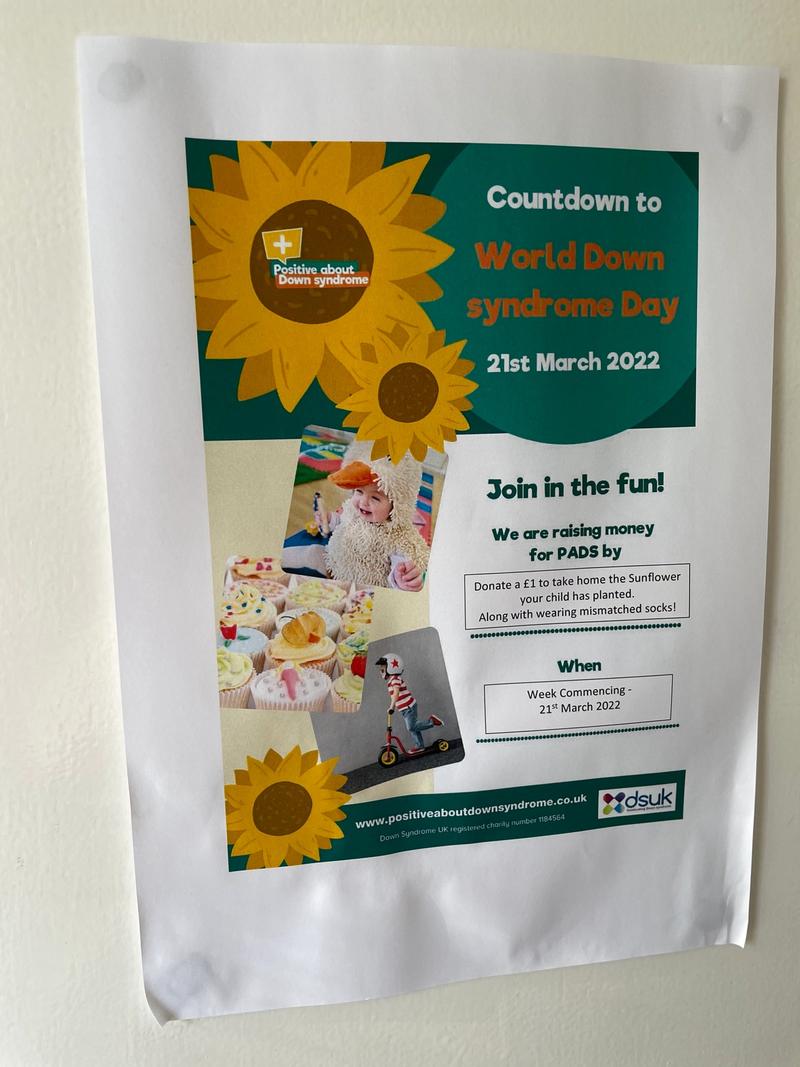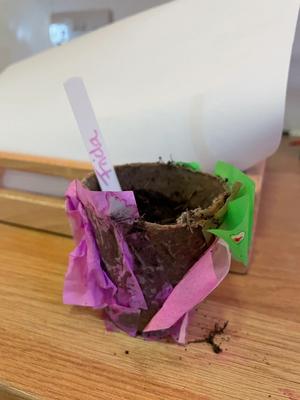
Happy World Down Syndrome Awareness Day 2022
It is World Down Syndrome Awareness day today and we are wearing our colourful 'lots of socks' and going to a party at Bristol Down Syndrome Trust dressed in PADS colours.
I thought I would share the piece I wrote for Frida's nursery as it covers a few bits that we have been doing with Frida recently.
Frida has been going to a really brilliant nursery since Last August and has settled really well. She is one of the gang in the baby room and every Thursday morning as I hand her over to one of the brilliant staff, I know she will have a fab day. She is comfortable, well understood, loved, respected and like every other child that attends her nursery is treated like the individual she is.
Frida’s key worker is perfect for her. She gets that all Frida needs is a bit more time to learn something, or get somewhere, but like us, she sees that Frida’s understanding and non verbal communication is doing her just fine.
The team at nursery wanted to mark World Down Syndrome Day some how and I had a really great meeting with the Head of Early Years to talk it through. We came up with a some ideas and I was invited to write a few words in the newsletter. I am sharing it here as it contains my thoughts about communication and inclusion and why Makaton is currently so useful to Frida as she navigates nursery.
We have been busy planting sunflowers for World Down Syndrome Day, and we are raising money for PADS by asking you to bring £1 to buy your child’s sunflower. This will be available all week to purchase.
On Thursday 24th March we ask all children and staff to come to nursery wearing mismatched socks too!
Frida’s Mum has written a piece to give you some more info!
You may see Snapdragons Keynsham celebrating World Down syndrome Day throughout March. The day itself is 21 March 2022, the 21st day of the third month. This is because a person with Down syndrome has 3 copies of chromosome 21 rather than the typical 2. This is a great opportunity to ask questions and maybe learn a bit more about Down syndrome. But for now, I wanted to introduce a couple of the activities that your child might like to participate in and why.
I am mum to Frida who is currently in the Baby Cottage. We are delighted at how well she has settled into nursery, how much fun she is having and how many friends she has already.
Frida’s favourite word is ‘star’. She has been working hard at pronouncing the ’s’ sound and is just about there with it now. Frida says several other words including family names and a very clear ‘whats that?’ and ‘who’s that?’, but perhaps not as many as most 19 month olds. That said, I am pretty certain that she has more Makaton signs than many toddlers of her age.
Makaton is a communication tool. Unlike British Sign Language, (think Rose from Strictly Come Dancing this year). Makaton (think Mr Tumble and Singing Hands) is a way of bridging the gap towards speaking, enabling earlier communication and reducing frustration. When a word or phrase is spoken, this is accompanied with a sign and, if necessary, a symbol. Most kids are visual learners, so what better than to have 3 ways to receive information? Hearing the words and phrases, and seeing them in a sign and a symbol reinforces understanding and gives an opportunity to build communication skills long before words come along. A quick google will often result in a video of someone demonstrating a sign, so it is easy to pick up the basics without even doing a course - or you can just watch Mr. Tumble on repeat like we do. It can be a lot of fun to learn something new and even more fun to see your young child asking for something (usually snacks!), or telling you something long before they can use words.
Because Frida has Down syndrome we knew that she was likely to have speech delay. In order to support her communication we introduced Makaton from a very early age. We had used sign language with our eldest daughter when she was a baby so it was something that came easily to us. Because all of us in our family (including grandparents) enjoy it and use it consistently, Frida has developed a really good repertoire of signs. She has an impressive range of animal signs (and sounds) and can make herself understood using signs and her limited spoken language.. When she started at Snapdragons, the staff in the Baby Cottage went on a Makaton training course and use signing with her to great effect. I found that her signing improved when she realised that it was something that was done outside of home as well. Within a couple of weeks, Frida was telling staff with her signs that she was tired and wanted to go to sleep - something I had never seen her do at home. I know that when she does start speaking, her knowledge of words will not have suffered because she is building a good bank of vocabulary by signing. She knows many more words than she can sign and understands most things we say to her - in fact she appears to have the same level of understanding of words as most kids her age.
So why am I telling you all of this? Well, primarily because I encourage everyone to introduce basic signs to their own children to help them communicate - which in turn reduces frustration associated with not feeling understood, and, because Frida will be moving through the nursery into preschool in the coming 2 and a half years, it would be great to think that her peers can interact with her and understand what she is signing to them and sign back to her - that is true inclusion.
To get the ball rolling and in celebration of World Down syndrome Day, Snapdragons Keynsham has committed to bringing back the ‘sign of the month’ - so I am hopeful that this will spark the same love of Makaton with your children that it has with ours. (please see sign in above part of the Newsletter)
Other things your child might get involved in are completing some learning packs teaching them the very basics of what it is to have Down syndrome, wearing mismatched socks, reading books and planting a sunflower seed and watching it grow. All of these things will hopefully gently introduce the concept that whilst there might be some differences, being different can be good and that everyone has their own unique individual characteristics that make them the brilliant person that they are. We hope your child enjoys them.
Frida is lucky - she has been born in a time where there is a lot of research about how to best support young children with Down syndrome to reach their full potential, whatever that might be for each individual. Sadly, due to outdated perceptions, this has not always been the case. One of the organisations working hard to provide support to new parents from pregnancy and beyond is ‘Positive About Down syndrome (PADS).’
PADS has given us all the tools we needed to provide the best start to Frida. This includes access to subsidised Makaton, speech & language, development, physio and potty training courses. It brings together experts to support families via their Facebook groups and peer-to-peer support which has resulted in groups of friends emerging all over the country as a vast support network. The team behind PADS also works hard to promote the rights of people with Down syndrome and provides counselling support to families who initially struggle with having a child with additional needs.
We are hoping that your child will want to take home their sunflowers at the end of the month and wear mismatched socks and would be grateful for a £1 suggested donation to go to PADS to help them to continue to do the excellent work that they do.
Please do not hesitate to get in touch with me if you would like any more reading ideas or information. I also have a blog - Frida’s Footsteps, which has more information about Frida and the things we do on it.
From all reports, the kids are loving planing their sunflowers and I am excited to see how they all take to learning Makaton! This month's sign in the newsletter was 'I feel happy!' What a lovely way to re-launch their regular feature.

Image of decorated pot with ‘Frida’ name tag - Frida’s sunflower seed to be taken home this week.
Main image is of a poster advertising a collection for the charity Positive About Down Syndrome by way of planting sunflowers at nursery and taking them home.
